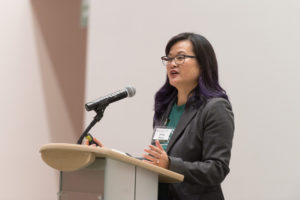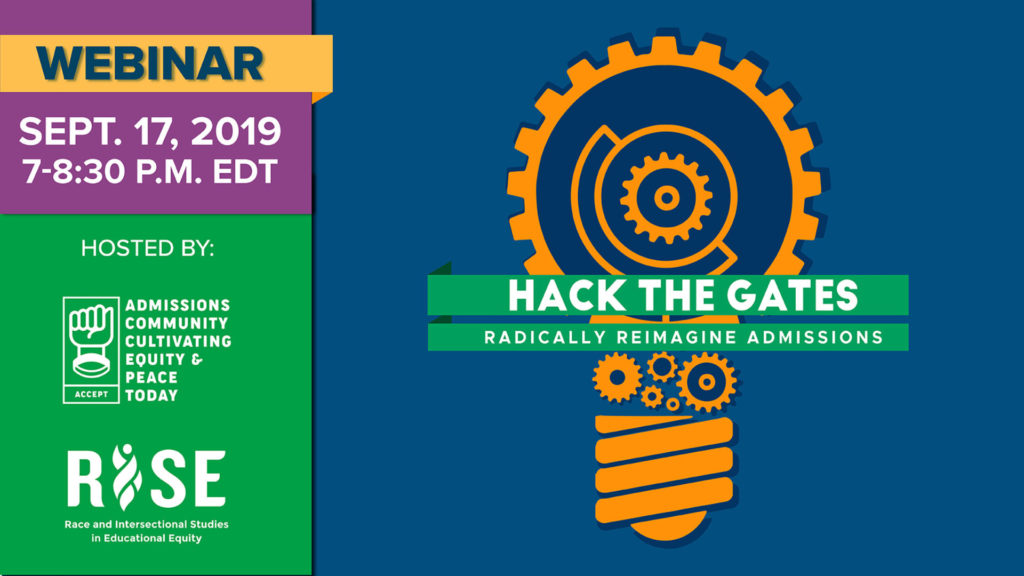Story by Samantha Ye

Colorado State University’s Race and Intersectional Studies in Education Equity Center is partnering with Admissions Community Cultivating Equity and Peace Today, a national professional association focused on empowering college admissions professionals, to “hack the gates” of college admissions.
Funded by a $76,000 grant from The Joyce Foundation, the collaborative project – named “Hack the Gates: Radically Reimagine Admissions” – aims to critically examine current structures and gatekeeping functions in college admissions, and to propose innovative solutions to dismantle barriers to access and participation in higher education for low-income students and students of color.
Hacking engagement
The current college admission systems represent a bridge that is broken for most people in the country, said OiYan Poon, associate professor in the School of Education and director of the RISE Center.
“With all the scandals this year around college admissions, we have an opportunity not to rebuild the same bridge that excludes so many people, but to think of a different way to do admissions,” said Poon.
Over the next year, RISE and ACCEPT will host a national “hackathon” conference and multiple webinars to engage college admissions leaders, policy makers, higher education researchers, and other stakeholders in reimagining and redesigning college admission processes. The hackathon acts as the centerpiece of the project, bringing together a variety of stakeholders in a design-thinking event. Informed by research, invited participants will examine college admissions pathways and generate equity-centered transformative solutions.
“We are inviting people who are ready to throw away how things currently work, and dream way outside the box,” said Poon.
The end product will be multiple policy briefs presenting and analyzing the accumulated ideas. These will be distributed to stakeholders and made publicly available before the 2020 elections, to inspire plans of action. Poon will be leading the research team in putting together the briefs. The ultimate goal of the project is to be able to offer potential policy reforms to increase college access for students of color and low-income students.
Shedding light on a broken system
Hack the Gates comes just after Operation Varsity Blues cast a national spotlight on the broken college admissions process.
The scandal was publicized in March 2019 when federal prosecutors charged more than 50 people in the Department of Justice’s largest-ever case of a college admissions scam, including ringleader Rick Singer. Dozens of wealthy parents were accused of buying their children’s place in elite U.S. universities by faking test scores or athletic accomplishments.
When the news broke, Poon said, few of the 5,000-plus college admissions professionals who comprise ACCEPT seemed surprised by the scandal.
“When you understand how college admissions works, you know there are vulnerabilities and holes and gaps in the system,” she said. “If you know the system well enough – and you ignore ethics – you can do what Rick Singer did and manipulate it. I think the field is just shocked someone did it.”
The scandal highlighted the myth of American meritocracy in college admissions, said Poon.
“When the system is so flawed, the question becomes not how to fix it, but how to replace it with something more equitable,” she said.
#HackTheGates
The Hack the Gates partnership brings together practitioners and researchers to rethink higher education from multiple perspectives. It will explore potential equity solutions by facilitating urgent evidence-based dialogue about confronting inequalities in the system.
The project is composed of three main parts:
Hackathon (Nov. 8-9, 2019)
Stakeholders from around the country will be invited to participate in this two-day conference, where they will discuss innovative ways to increase racial and economic equity in college access. It will take place in Washington, D.C.
Webinars and meetups (throughout the next year)
 RISE and ACCEPT will host multiple webinars and online town halls through social media, before and after the hackathon. Anyone can join these online events to learn about college admissions. The first webinar, entitled “How did we get here? The evolution of college admissions,” will take place on Tuesday, Sept. 17, 7-8:30 p.m. EDT. Interested participants can register here.
RISE and ACCEPT will host multiple webinars and online town halls through social media, before and after the hackathon. Anyone can join these online events to learn about college admissions. The first webinar, entitled “How did we get here? The evolution of college admissions,” will take place on Tuesday, Sept. 17, 7-8:30 p.m. EDT. Interested participants can register here.
There will also be several ACCEPT meetings throughout the year.
Policy briefs (August 2020)
The research team will present findings from the project discussions through policy briefs detailing tangible, systemic reform proposals for public consideration.
“By bringing together all of those who engage with the college admissions process, we have the rare opportunity to critically examine the road to higher education,” said Marie Bigham, ACCEPT founder and leader. “We look forward to radically reimagining admissions with RISE.”
The combined expertise of practitioners and researchers fits into the RISE Center’s goals of shaping national conversations about education policies.
“It goes back to CSU’s land-grant mission of solving public problems,” said Poon. “And with this partnership between ACCEPT and RISE, it’s a real research-practice partnership. It’s time to come up with a new system of college admissions that improves access to higher education for our diversifying state and nation.”
The Race and Intersectional Studies in Education Equity Center is housed in CSU’s School of Education, part of the College of Health and Human Sciences. RISE aims to advance intersectional racial justice and equity in educational institutions’ dialogues, and collaboration between researchers, practitioners, and community stakeholders.
ACCEPT is an online association of more than 5,000 college admissions professionals who are committed to equity and justice in college access.